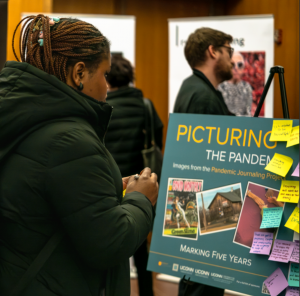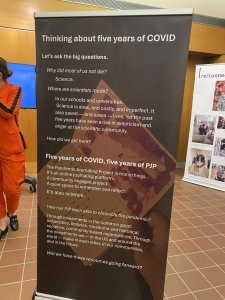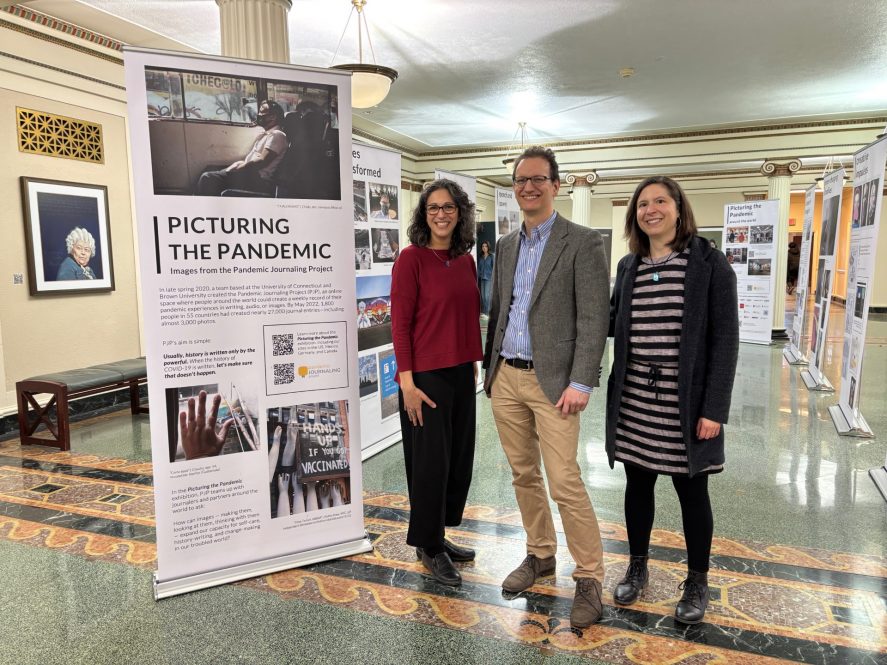As the world was facing the unexpected during the COVID-19 pandemic, anthropologists Sarah Willen (UConn) and Katherine Mason (Brown University) had the future at the forefront of their thinking.
As co-founders of the Pandemic Journaling Project (PJP), their goal was to create a dataset to help people in the future understand the experience of living through a pandemic. Now, the first wave of data from the weekly journaling platform, containing nearly 27,000 entries from over 1,800 people around the world, is available to approved researchers at the Qualitative Data Repository (QDR) at Syracuse University, as they explain in a new research article.
When the PJP was created five years ago, Willen and Mason’s mission was focused not only data collection, but also on the community-engaged goal of meeting a shared human need.
“The research dimensions of PJP have been amazing, and it’s really rewarding to finally be able to publish these data,” says Willen, a Professor of Anthropology at UConn. “But on a broader level, it means a lot more that we could offer something to the public, in a moment of crisis, that 1,800 people around the world found useful.”
One secret to the project’s success, Willen explained, is that PJP invited people to recognize the power of their voice and the value of their stories. In this respect, the project is a testament to the role that universities can play in documenting public health challenges and their impact.

“We need to remember that universities have a lot of roles to play; yes, it’s about educating the workforce and creating cutting-edge research. But it’s also about serving the public in coming to understand ourselves and our world better,” says Willen. “That’s what we’ve tried to do.”
Willen and Mason had three primary motives for the project: historical preservation, supporting mental health, and creating opportunities for reflection and coping.
“We wanted to get people’s accounts on record – to ‘predesign an archive’. Second, while we couldn’t make any promises, we knew that writing can have therapeutic benefits for some people,” says Willen. “Above and beyond all of that, we wanted to give people space to just reflect. Even if reflection isn’t therapeutic in a formal way, it can – and for many, did – have real value and meaning.
As anthropologists, Willen and Mason took an interdisciplinary approach to their data collection. With their eye on posterity, they designed the project to collect data that future researchers in a wide range of fields might use regardless of whether they had been involved in data collection.
“From the very beginning we had to ask ourselves, what will people want to know? What sorts of data should we try to gather?” Willen says.
As social scientists developing a data archive, they focused on balancing their commitment to collecting as much information as possible about the people whose stories were being recorded and their commitments, as social scientists, to preserve confidentiality and anonymity.
“We created an advisory board that was super interdisciplinary and diverse because we knew we couldn’t answer questions about what future researchers might want to know on our own. We consulted with people from different disciplines to maximize the chance that people in different fields could use to use the data,” explains Willen.
Willen highlights the crucial role students played in the project. From framing research questions, to assisting with exhibitions, to presenting at conferences, she emphasizes how teamwork between faculty and students has been an essential element for success.

“We’ve wanted to give students a chance not only to be part of the research, but really to show up as their full selves,” says Willen. “We essentially created a lab space where we train people to do research and work with data in a lot of different ways. So, it was never just ‘let’s collect data’, but rather ‘let’s create an environment in which we’re learning, adapting, training people and giving students increasing responsibility.'”
The efforts of this project on UConn’s campus are a reminder to universities that students are capable of these accomplishments if given the opportunity.
“So many different parts of the University believed in us and lent their support, which really speaks to the value of universities investing in good ideas that emerge within their campus community,” says Willen.
In their most notable public-facing endeavor, PJP brought pandemic journals to life in the Picturing the Pandemic exhibition, which traveled to seven locations around the globe including UConn’s Homer Babbidge Library in March 2025. The exhibition’s final panel highlights the vital role of universities and other public institutions in supporting science, prompting the question of whether or not we will have these resources going forward.
“At a university, you have this extraordinary gift of being in a place where people with all different kinds of training and interests can hang out together, learn from each other, ask big questions and find some answers – then put those answers before the public and invite people to come up with their own answers,” says Willen.
Supportive investments like these can create opportunities to document history and make sense of global impacts, just as the Pandemic Journaling Project did.
“Universities can be both a window into what’s happening in our world, and a door to new ways of asking and reflecting,” says Willen.



